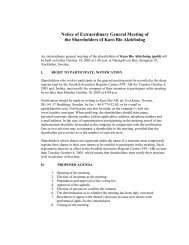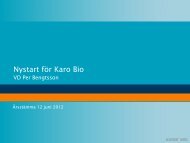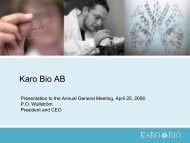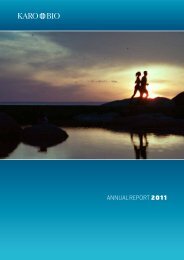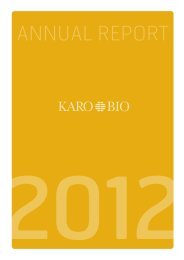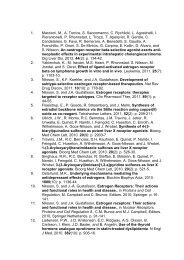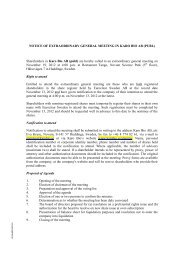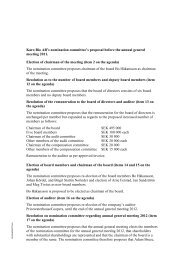Corporate Governance Report 2010.pdf - Karo Bio
Corporate Governance Report 2010.pdf - Karo Bio
Corporate Governance Report 2010.pdf - Karo Bio
You also want an ePaper? Increase the reach of your titles
YUMPU automatically turns print PDFs into web optimized ePapers that Google loves.
CORPORATE GOVERNANCE REPORT 2010<br />
KARO BIO AB (PUBL)<br />
EXTRACT FROM KARO BIO’S<br />
PRINTED ANNUAL REPORT 2010<br />
a
<strong>Corporate</strong> <strong>Governance</strong> <strong>Report</strong><br />
INTRODUCTION<br />
<strong>Karo</strong> <strong>Bio</strong> AB was formed in 1987 and has developed from<br />
being a research company to its current position of being a<br />
pharmaceutical discovery and development company. The<br />
Group consists of the Parent Company, <strong>Karo</strong> <strong>Bio</strong> AB, and the<br />
subsidiary, <strong>Karo</strong> <strong>Bio</strong> Research AB. The subsidiary conducts<br />
no operations.<br />
The Board of Directors of <strong>Karo</strong> <strong>Bio</strong> hereby submits the<br />
corporate governance report for 2010, compliant with the<br />
Annual <strong>Report</strong>s Act (ÅRL 6 kap 6 §) and the Swedish Code<br />
of <strong>Corporate</strong> <strong>Governance</strong> (“ the Code”) (available at<br />
www.corporategovernanceboard.se), which has been applied<br />
by <strong>Karo</strong> <strong>Bio</strong> since July 1, 2008. No deviation from the Code<br />
was made by the company in 2010. The corporate governance<br />
report has been examined by the company’s auditor, in<br />
accord ance with the Annual <strong>Report</strong>s Act. It does not constitute<br />
a portion of the formal annual report documentation.<br />
SHAREHOLDERS<br />
<strong>Karo</strong> <strong>Bio</strong> AB’s shares have been listed on the NASDAQ OMX<br />
Stockholm exchange since 1998. Each share carries entitlement<br />
to one vote and carries the same right to share in the<br />
company’s assets and profits.<br />
As per December 31, 2010, the number of shareholders<br />
amounted to 12,259 (12,874). According to the shareholder list<br />
provided by Euroclear Sweden AB as per December 31, 2010,<br />
with adjustments for shares then unregistered by Euroclear<br />
following the rights issue which was completed in December<br />
2010, JP Morgan Bank had accumulated shareholdings of 8.4<br />
percent, Avanza Pension 8.0 procent, and Friends Provident<br />
International 5.0 percent, respectively. A proportion of 0.4<br />
(39) percent of shareholders held 1,000 shares or fewer. The<br />
ten largest shareholders owned 35 (28) percent of the total<br />
number of shares. The proportion of foreign shareholders<br />
amounted to 31 (19) percent.<br />
There are no limitations that apply to the transferability of<br />
<strong>Karo</strong> <strong>Bio</strong> shares due to either legal restrictions or the Articles<br />
of Association. To the best of <strong>Karo</strong> <strong>Bio</strong>’s knowledge, no agreements<br />
exist between any shareholders which could possibly<br />
limit the transferability of shares. No single shareholder<br />
controls more than 10 percent of the total number of shares in<br />
<strong>Karo</strong> <strong>Bio</strong>.<br />
No breaches of the listing agreement or good practice on<br />
the stock market according to resolutions from the Exchange’s<br />
disciplinary committee or the Swedish Securities Council<br />
disciplinary committee occurred during the financial year.<br />
<strong>Karo</strong> <strong>Bio</strong>’s corporate governance model<br />
The chart below illustrates <strong>Karo</strong> <strong>Bio</strong>’s corporate governance model<br />
and the manner in which the central bodies interact.<br />
Important external and internal rules,<br />
regulations and policies affecting<br />
corporate governance:<br />
Nominating<br />
Committee<br />
Compensation<br />
Committee<br />
Finance,<br />
Investor Relations, IT<br />
& Human Resources<br />
Preclinical<br />
Research & Development<br />
GENERAL MEETINGS<br />
OF SHAREHOLDERS<br />
BOARD OF DIRECTORS<br />
CEO &<br />
MANAGEMENT TEAM<br />
Business Development<br />
Clinical Development<br />
& Regulatory Affairs<br />
External<br />
Auditors<br />
Audit<br />
Committee<br />
Internal audit<br />
Important internal rules, regulations and<br />
policies:<br />
• Articles of Association<br />
• The Board of Directors’ work procedure<br />
• Instructions for the President including<br />
instructions regarding financial reporting<br />
• Instructions to the respective<br />
Board committees<br />
• Information policy<br />
• Insider policy<br />
• Financial policy<br />
• Risk management policy<br />
• Financial manual<br />
• Code of Conduct and provisions regarding<br />
business ethics<br />
Important external rules and regulations:<br />
• Swedish Companies Act<br />
• Swedish Book-keeping Act<br />
• Swedish Annual Accounts Act<br />
• NASDAQ OMX Stockholm’s Rule Book for<br />
Issuers<br />
• Swedish Code of <strong>Corporate</strong> <strong>Governance</strong><br />
44
<strong>Corporate</strong> <strong>Governance</strong> <strong>Report</strong><br />
INFORMATION REGARDING OUTSTANDING SHARES IN KARO BIO<br />
At December 31, 2010, the company had a total of 387,063,972<br />
shares (of which 383,186,644 shares were registered and<br />
3,877,328 shares at that time were still unregistered with the<br />
Swedish Companies Registration Office) with a par value<br />
of SEK 0.50. Each share carries entitlement to one vote and<br />
carries the same right to share in the company’s assets and<br />
profits.<br />
On November 24, 2010, shareholders at an extraordinary<br />
general meeting authorized the Board to issue shares within<br />
the framework of an Equity Credit Facility (ECF) which,<br />
subject to approval by future shareholders’ meetings, gives<br />
the company the right, but not the obligation, to issue shares<br />
equivalent to MUSD 35, approx MSEK 240, Azimuth Opportunity<br />
Ltd. (Azimuth) through 2013.<br />
GENERAL MEETING OF SHAREHOLDERS<br />
The highest decision-making body is the general meeting<br />
of shareholders, where the shareholders exercise their influence<br />
in the company. Each share is associated with one vote.<br />
Shareholders wishing to participate in the general meeting<br />
of shareholders, either in person or via a representative, must<br />
have their names entered in the shareholders’ register maintained<br />
by Euroclear Sweden AB no later than five weekdays<br />
before the general meeting and must report their intention to<br />
attend to the company in accordance with the notice.<br />
Notice of a general meeting of shareholders is given via<br />
noti ces in the press and via the company website<br />
(www.karobio.com). The annual general meeting shall be<br />
held within six months from the end of the financial year.<br />
At the annual general meeting, the shareholders vote on<br />
proposed resolutions regarding such matters as the election<br />
of the members of the Board of Directors and, where appropriate,<br />
the auditors, the manner of appointment of the Nomination<br />
Committee and discharge from responsibility for the<br />
members of the Board of Directors and President for the last<br />
year. Resolutions are also adopted regarding the preparation<br />
of the financial statements, the allocation of profit or treatment<br />
of loss, the fees for the Board of Directors and auditors<br />
and guidelines for remuneration to the President and other<br />
members of executive management.<br />
2010 Annual general meeting<br />
At the annual general meeting in 2010, the Board of Directors<br />
presented a report detailing its work during the year, together<br />
with general corporate governance issues. The President<br />
informed the annual general meeting of the Group’s development<br />
and financial position, and commented on the results<br />
of operations for 2009. The annual general meeting approved<br />
the annual report and consolidated financial statements for<br />
2009, as prepared by the Board of Directors and the<br />
President, resolved on the treatment of the company’s loss<br />
and discharged the members of the Board and President from<br />
liability. The general meeting resolved that no dividend<br />
would be paid.<br />
Furthermore, the chairman of the Nomination Committee<br />
presented an account of the Committee’s work for the year,<br />
together with a justification for the proposal submitted. The<br />
meeting resolved to pay remuneration to the Board and auditors<br />
in accordance with the proposal of the Nomination Committee.<br />
Bo Håkansson (also elected Chairman of the Board),<br />
Johan Kördel, Jon Risfelt, and Birgit Stattin Norinder were<br />
reelected as Directors, and Margaret von Platen was elected as<br />
a new member of the Board. Leon E. Rosenberg, who joined<br />
the Board in 2000 and served as Board Chairman since 2007,<br />
declined re-election and stepped down from the Board.<br />
No election of auditor was carried out, as at the 2007<br />
annual general meeting, the company’s auditor, Pricewaterhouse<br />
Coopers AB, was elected for a mandate period of four<br />
years, until the 2011 annual general meeting. The meeting<br />
was informed the auditor in charge since the 2008 annual<br />
general meeting was Håkan Malmström.<br />
Board members Bo Håkansson, Johan Kördel, Jon Risfelt<br />
and Birgit Stattin Norinder, the auditor in charge and the<br />
chairman of the nomination committee were present at<br />
the 2010 annual general meeting. The minutes of the<br />
annual general meeting are available at <strong>Karo</strong> <strong>Bio</strong>’s website<br />
(www.karobio.com).<br />
2010 Extraordinary general meeting<br />
On November 24, 2010, an extraordinary general meeting was<br />
held, at which the Board of Directors’ decision on a new issue<br />
of shares with pre-emptive rights for shareholders, a proposal<br />
for a financing contract through an Equity Credit Facility, a<br />
proposal to give the Board of Directors authority to decide<br />
upon issues of new shares, and proposals for changes to the<br />
Articles of Association regarding the limits upon share capital<br />
and number of shares, the eventual location of general meetings,<br />
and the means of notice for a general meeting, were all<br />
approved. The minutes of the extraordinary general meeting<br />
are available at <strong>Karo</strong> <strong>Bio</strong>’s website (www.karobio.com).<br />
NOMINATION COMMITTEE<br />
At the 2010 annual general meeting, it was resolved that the<br />
four largest shareholders per August 31, 2010 shall appoint<br />
one representative each who is not a Board member, to form<br />
the Nomination Committee in respect of the 2011 annual<br />
general meeting, together with the Chairman of the Board.<br />
These representatives shall be appointed and publicly announced<br />
no later than six months before the 2011 annual<br />
general meeting. The Nomination Committee shall appoint<br />
a chairman internally. However, the Chairman of the Board<br />
may not be Chairman of the Nomination Committee. In<br />
the event that a shareholder declines participation or leaves<br />
the Nomination Committee before its work is completed,<br />
the right to appoint a representative will devolve to the next<br />
largest shareholder not represented in the Nomination Committee.<br />
In the event that significant changes take place in the<br />
ownership structure after the formation of the Nomination<br />
Committee, the composition of the Nomination Committee<br />
45
<strong>Corporate</strong> <strong>Governance</strong> <strong>Report</strong><br />
shall also be changed in accordance with the principles<br />
above.<br />
The Nomination Committee shall develop proposals for<br />
presentation to the annual general meeting for adoption as<br />
regards the chairman of the meeting, Chairman and other<br />
members of the Board of Directors, fees to the Board of<br />
Directors, fees to and election of auditor (where applicable)<br />
and principles for the appointment of the Nomination Committee.<br />
The Nomination Committee’s mandate period runs<br />
until the appointment of a new Nomination Committee in<br />
accordance with the resolution of the annual general meeting<br />
regarding the principles for appointment of the Nomination<br />
Committee. To the extent it deems necessary, and at the company’s<br />
expense, the Nomination Committee shall have the<br />
right to engage other resources such as external consultants<br />
within the framework of its assignment.<br />
The Nomination Committee for the 2011 annual general<br />
meeting consists of Bengt Belfrage (Nordea Fonder), chairman,<br />
Thomas Josefsson (Borås Postorder), Adam Bruce (Carlbergssjön<br />
AB), Mikael Lönn (own mandate), and Bo Håkansson,<br />
Chairman of the Board of <strong>Karo</strong> <strong>Bio</strong>. The composition of<br />
the Nomination Committee was announced on October 26,<br />
2010, in conjunction with the interim report for the period<br />
January to September 2010. Shareholders may submit proposals<br />
to the Nomination Committee at the address Valberedningen,<br />
<strong>Karo</strong> <strong>Bio</strong> AB, Novum, 141 57 Huddinge, Sweden.<br />
president and CEO<br />
FREDRIK LINDGREN (1971)<br />
Bjärred, Sweden<br />
Employed by <strong>Karo</strong> <strong>Bio</strong> since 2010<br />
Education: Law degree from Lund University, basic<br />
university studies in philosophy and administration,<br />
Financial Analyst graduate Stockholm School of<br />
Economics.<br />
Primary experience: Responsible since early<br />
1990s for strategic company processes such as<br />
reconstructions, acquisitions, capitalizations<br />
within, among others, the biotech sector. Previous<br />
employers include Active <strong>Bio</strong>tech AB, Meaning<br />
Green AB, Midelfart Sonesson AB and <strong>Bio</strong>lin Scientific<br />
AB.<br />
Other assignments: Board member of Genovis AB,<br />
Mecena and ProstaLund AB<br />
Shares in <strong>Karo</strong> <strong>Bio</strong> AB: 1,250,000<br />
Board members<br />
BO HÅKANSSON (1946),<br />
Eslöv, Sweden<br />
Board member since 2009. Chairman since 2010.<br />
Education: Degree in Economics and Business<br />
Administration, and Med Dr h.c., Lund University<br />
Primary experience: Self employed since 1970.<br />
Positions as CEO, board member or chairman in<br />
various listed companies since 1986, including<br />
Wihlborgs Fastigheter AB, Active <strong>Bio</strong>tech AB,<br />
Midelfart Sonesson AB and ACAP Invest AB. Founder<br />
of Hansa Medical AB, Active <strong>Bio</strong>tech AB and ACAP<br />
Invest AB.<br />
Other assignments: Chairman of Exini Diagnostics<br />
AB and Hansa Medical AB. Board member in<br />
Farstorps Gård AB, Farstorps Invest AB and POC<br />
Sweden AB. Deputy board member in Cartela R&D AB.<br />
Shares in <strong>Karo</strong> <strong>Bio</strong>: 11,949,531<br />
Independent board member<br />
JOHAN KÖRDEL (1962)<br />
Malmö, Sweden<br />
Board member since 2009<br />
Education and title: M.Sc., and PhD in physical<br />
chemistry and Associate Professor, Lund University<br />
Primary experience: Extensive experience from<br />
leading positions in research and business development<br />
in international pharmaceutical and biotechnology<br />
companies, primarily at Pharmacia and<br />
<strong>Bio</strong>vitrum.<br />
Other assignments: Chairman and President in<br />
Chori Pars AB. Board member in EQL Pharma AB.<br />
Shares in <strong>Karo</strong> <strong>Bio</strong>: 33,335<br />
Independent board member<br />
MARGARET VON PLATEN (1959)<br />
Stockholm, Sweden<br />
Board member since 2010<br />
Primary education: B.Soc. Sc., Uppsala<br />
University and MBA, Columbia<br />
Business School.<br />
Primary experience: Former board member<br />
in Nordstjernan AB and Världsnaturfondens<br />
Allemansfond.<br />
Other assignments: None<br />
Shares in <strong>Karo</strong> <strong>Bio</strong>: None<br />
Independent board member<br />
JON RISFELT (1961)<br />
Täby, Sweden<br />
Board member since 2009<br />
Education: M.Sc. Chemical Technology,<br />
Royal Institute of Technology, Stockholm<br />
Primary experience: Full-time board member in<br />
various companies. Prior operative senior positions<br />
include Ericsson, SAS, American Express,<br />
Nyman & Schultz (CEO), Europolitan and Vodafone<br />
Sverige (CEO) and Gambro Renal (CEO).<br />
Other assignments: Chairman in Ortivus AB, C3<br />
Technologies AB and Mawell Oy. Board member<br />
in TeliaSonera AB, Bilia AB, ÅF AB, Braganza AS,<br />
Vanna AB, Ticket Travel Group AB, Ticket Leisure<br />
Travel AB and Ticket Business Travel AB.<br />
Shares in <strong>Karo</strong> <strong>Bio</strong>: 17,500<br />
Independent board member<br />
Birgit Stattin Norinder (1948)<br />
London, United Kingdom<br />
Board member since 2007<br />
Education: M.Sc.Pharm., Uppsala University<br />
Primary experience: Extensive experience from<br />
leading positions within research and development<br />
in several international pharmaceutical companies.<br />
Former CEO and chairman of Prolifix Ltd.<br />
Other assignments: Deputy Board Member in<br />
Wingfirm AB.<br />
Shares in <strong>Karo</strong> <strong>Bio</strong>: None<br />
Independent board member<br />
board members<br />
- employee representatives<br />
BO CARLSSON (1958)<br />
Stockholm, Sweden<br />
Employee representative, appointed 1997<br />
Education: Specialist teacher exam, Uppsala<br />
University<br />
Primary experience: Employed by <strong>Karo</strong> <strong>Bio</strong> since<br />
1989, Project Manager<br />
Shares in <strong>Karo</strong> <strong>Bio</strong>: 20,666<br />
Employee stock options: 2,554<br />
JOHNNY SANDBERG (1967)<br />
Danderyd, Sweden<br />
Employee representative, appointed 2006<br />
Education: <strong>Bio</strong>medical analyst, Vårdhögskolan<br />
Primary experience: Employed by <strong>Karo</strong> <strong>Bio</strong> since<br />
1994, Senior Research Investigator<br />
Shares in <strong>Karo</strong> <strong>Bio</strong>: 26,250<br />
Employee stock options: 2,675<br />
EVA KOCH (1966)<br />
Stockholm, Sweden<br />
Employee representative (deputy), appointed 2010<br />
Education: PhD. in organic chemistry<br />
Primary experience: Employed by <strong>Karo</strong> <strong>Bio</strong> since<br />
1999, Senior Research Scientist<br />
Shares in <strong>Karo</strong> <strong>Bio</strong>: 6,500<br />
Employee stock options: 3,405<br />
46
<strong>Corporate</strong> <strong>Governance</strong> <strong>Report</strong><br />
Nomination Committee proposals are announced, at latest,<br />
in conjunction with the notice to attend the annual generalmeeting.<br />
The work of the Nomination Committee since the 2010<br />
annual general meeting<br />
Since the Nomination Committee was appointed in October<br />
2010, it has met on several occasions. The Chairman of<br />
the Board has described to the Nomination Committee the<br />
process applied in the annual assessment of the Board, the<br />
members of the Board and the President and has also described<br />
the outcome of these assessments, where relevant, and<br />
the company’s strategy. In advance of the forthcoming annual<br />
general meeting, the Nomination Committee has worked out<br />
proposals regarding the procedure for appointment of the<br />
next Nomination Committee. The Nomination Committee<br />
will present proposals regarding the fee for the Board of Directors,<br />
and in order to form an opinion of a reasonable level<br />
of remuneration, an analysis and comparison with similar<br />
companies has been carried out. In the process of nominating<br />
auditors and determining auditor’s fees, the Nomination<br />
Committee has been assisted by the Board of Directors.<br />
Based on the assessment of the Board of Directors and the<br />
company’s strategy etc., as well as on the present Board members’<br />
availability for re-election, the Nomination Committee<br />
makes an assessment of whether the present Board meets the<br />
requirements that will be placed on the Board as a result of<br />
the company’s financial position and future focus, or whether<br />
the composition of skills and experience needs to be changed.<br />
The Nomination Committee’s proposal regarding the election<br />
and re-election of members of the Board, its substantiated<br />
statement concerning proposals to the Board of Directors<br />
and other proposals are submitted no later than in conjunction<br />
with the notice to attend the annual general meeting.<br />
EXTERNAL AUDITORS<br />
According to the Articles of Association, <strong>Karo</strong> <strong>Bio</strong> shall<br />
engage a registered public accounting firm as external auditor.<br />
At the annual general meeting 2007, the registered public<br />
accounting firm PricewaterhouseCoopers AB was re-elected<br />
as auditor for a mandate period of four years until the close of<br />
the 2011 annual general meeting. Since the 2008 annual general<br />
meeting, auditor in charge has been Authorized Public<br />
Accountant Håkan Malmström, who is also auditor in charge<br />
of the companies NCC AB, Gambro AB, and Nordstjernan<br />
AB, among others. At the 2011 annual general meeting, the<br />
current auditors will be nominated for re-election.<br />
The auditors review the accounting records and administration<br />
of the Parent Company and the Group on behalf of the<br />
annual general meeting. The external audit of the accounting<br />
records of the Parent Company and the Group and the<br />
administration of the Board of Directors and the President is<br />
performed according to generally accepted auditing standards<br />
in Sweden. The Company’s auditor in charge participates<br />
in certain of the Board’s Audit Committee’s meetings. The<br />
auditor participates in at least one Board meeting per year to<br />
review the year’s audit and to conduct a discussion with the<br />
Members of the Board without the presence of the President.<br />
The company has entrusted the auditor to review one of<br />
the interim reports for 2010 in accordance with the Code’s<br />
Attendance rate 1)<br />
Independent<br />
Name of<br />
Board member<br />
Elected to<br />
Board<br />
Total annual<br />
fee, SEK<br />
Ordinary<br />
Board<br />
meetings<br />
Extraordinary<br />
Board<br />
meetings<br />
Compen -<br />
sation<br />
Committee<br />
Audit<br />
Committee<br />
In relation to<br />
the Company<br />
and executive<br />
management<br />
In relation to<br />
the Company’s<br />
major<br />
shareholders<br />
Elected by the general meeting<br />
Bo Håkansson (Chairman after AGM April 23, 2010) 2009 421 7 (7) 8 (8) - 2(2) Yes Yes<br />
Johan Kördel 2009 185 7 (7) 8 (8) - 2(2) Yes Yes<br />
Margaret von Platen 2) 2010 135 4 (5) 3 (3) - - Yes Yes<br />
Jon Risfelt 2009 187 7(7) 8 (8) - 2(2) Yes Yes<br />
Leon E. Rosenberg<br />
2000 129 2 (2) 5 (5) 2(2) - Yes Yes<br />
(Chairman through AGM April 23, 2010) 3)<br />
Birgit Stattin Norinder 2007 184 7 (7) 6 (8) 2(2) - Yes Yes<br />
Employee representatives<br />
Bo Carlsson 1997 - 7 (7) 8 (8) - - No 6) Yes<br />
Johnny Sandberg 2006 - 7 (7) 8 (8) - - No 6) Yes<br />
Eva Koch, Deputy 4) 2010 - 0 (0) 0 (3) - - No 6) Yes<br />
Henrik Jernstedt, Deputy 5) 2005 - 1 (1) 2 (2) - - No 6) Yes<br />
1) The figures in parentheses indicate the number of meetings during each member’s mandate period . Following the AGM on April 23, 2010, both the Compensation Committee and the<br />
Audit Committee are composed of the Board in its enirety. The attendance rates provided are for separate committee meetings that were held until April 23, 2010.<br />
2) The board member was elected at the annual general meeting 2010.<br />
3) The board member left his assignment in conjunction with the annual general meeting 2010.<br />
4) Appointed employee representative (deputy) on October 27, 2010<br />
5) Left his employment at <strong>Karo</strong> <strong>Bio</strong> on March 24, 2010<br />
6) Employee of <strong>Karo</strong> <strong>Bio</strong> AB<br />
47
<strong>Corporate</strong> <strong>Governance</strong> <strong>Report</strong><br />
statues. Information regarding the auditors’ fee is included in<br />
Note 26 in the 2010 annual report.<br />
BOARD OF DIRECTORS<br />
The Board of Directors has the overall task of administering<br />
the company’s affairs on behalf of the shareholders in the<br />
best possible manner. The Board shall continuously assess the<br />
Group’s operations, development and financial situation, as<br />
well as assessing its operative management. Among its other<br />
work, the Board determines issues concerning the Group’s<br />
strategic direction and organization, business plans, financial<br />
plans and budget, and also makes decisions regarding<br />
important agreements, major investments and commitments,<br />
in addition to financial, information and insider and risk<br />
management policies.<br />
The Board of Directors works according to a work procedure<br />
which is determined annually and which regulates the<br />
frequency and agenda of Board meetings, the distribution<br />
of material for meetings and matters to be presented to the<br />
Board as information or for resolution. The working procedure<br />
further regulates the manner in which the tasks of the<br />
Board are divided between the members of the Board and<br />
any Board committees. The Board has also approved instructions<br />
for the President, which regulate the division of duties<br />
between the Board of Directors, the Chairman of the Board,<br />
and the President, as well as defining the authorities of the<br />
President.<br />
The Chairman of the Board plans the Board meetings together<br />
with the President. In advance of each Board meeting,<br />
the Directors receive a written agenda and adequate supporting<br />
documents. At each regular Board meeting, a review of<br />
operations is conducted, which includes developments and<br />
progress within research and development, business development,<br />
the Group’s operating results and financial position,<br />
financial reporting and forecasts.<br />
The Chairman leads the work of the Board of Directors,<br />
represents the company in ownership issues, and is responsible<br />
for the assessment of the Board of Directors’ work. In<br />
addition, the Chairman is responsible for ongoing interaction<br />
with management and for monitoring that the Board fulfils<br />
its duties. According to the Articles of Association, the Board<br />
shall consist of a minimum of five and a maximum of nine<br />
members, elected by the general meeting of shareholders,<br />
with no deputy members. The Board is competent to make<br />
decisions when more than half of the total number of Directors<br />
are present. The members of the Board shall possess<br />
broad competence and versatility, as well as have backgrounds<br />
suitable for <strong>Karo</strong> <strong>Bio</strong>’s organisation, industry and operations.<br />
New members of the Board undergo introductory training so<br />
as to rapidly obtain the knowledge expected to best safeguard<br />
the interests of the company and the shareholders.<br />
THE WORK OF THE BOARD OF DIRECTORS IN 2010<br />
During 2010, seven regular meetings, at which minutes have<br />
been kept, and eleven special Board meetings have been<br />
held. At all of these meetings, the Board of Directors has<br />
been competent to make decisions. Up to and including June<br />
2010, Thomas Wallinder, solicitor, Mannheimer Swartling<br />
Advokat byrå, has acted as Secretary to the Board, thereafter<br />
succeeded by Erika Söderberg Johnson, Chief Financial<br />
Officer, <strong>Karo</strong> <strong>Bio</strong>. Resolutions are taken by the Board after<br />
an open discussion, led by the Chairman. Major matters dealt<br />
with during 2010 have included the recruitment of a President<br />
and Chief Executive Officer, strategic issues dealing<br />
with clinical projects, research operations, business development<br />
and financing through a rights issue and an Equity<br />
Credit Facility agreement. Decisions have been made in<br />
important areas such as business and financial plans, strategic<br />
issues related to scientific plans, substantial contracts, major<br />
capital expenditures, budget, financing and other central<br />
company policies. The Board continuously evaluates the<br />
company’s performance and development.<br />
Board of Directors’ fees, independence and attendance rate<br />
The table on the previous page illustrates the independence of<br />
the Board as regards the company, executive management and<br />
the company’s major shareholders, in addition to attendance<br />
rates and expensed fees for 2010, as determined by the annual<br />
general meeting.<br />
BOARD COMMITTEES<br />
In 2010, the Board has, based on its size and composition,<br />
resolved that the respective tasks of the Compensation Committee<br />
and the Audit Committee are best conducted by the<br />
Board in its entirety, and that no preparatory committees<br />
should be appointed. After the 2010 annual general meeting,<br />
the Board in its entirety thus attends to the matters designated<br />
for preparatory Compensation and Audit Committees<br />
according to the Companies Act and the Code.<br />
Compensation Committee<br />
During the period January 1 through April 23, 2010, the<br />
Compensation Committee held two separate recorded meetings.<br />
The Compensation Committee then consisted of Leon<br />
E. Rosenberg (Chairman) and Birgit Stattin Norinder, both<br />
of whom were independent in relation to the company’s major<br />
shareholders, as well as to the Company and executive management.<br />
After the 2010 annual general meeting, the Compensation<br />
Committee is formed by the Board of Directors in<br />
its entirety.<br />
The work of the Compensation Committee is governed by<br />
instructions determined annually by the Board of Directors,<br />
and included in the work procedures for the Board. When<br />
the work of the Compensation Committee was conducted in<br />
a separate committee, it submited proposals for guidelines for<br />
the remuneration of executive management, and proposals for<br />
the President’s salary and other terms of employment, determined<br />
salaries and terms of employment for other members<br />
of the executive management team and prepared proposals for<br />
incentive programs and other forms of bonus or compensation<br />
schemes for employees. These tasks have since the 2010<br />
annual general meeting been performed by the Board of<br />
Directors in its entirety.<br />
The President may present Compensation Committee<br />
related issues, but does not participate in deliberations which<br />
involve his own salary and terms of employment. When it was<br />
a separate committee, the Committee chairman was responsible<br />
for ensuring that the Committee’s meetings were recorded<br />
48
<strong>Corporate</strong> <strong>Governance</strong> <strong>Report</strong><br />
according to instructions and that the Board of Directors was<br />
continually kept informed of the Committee’s work through<br />
the distribution of minutes, as well as, when necessary, submitting<br />
matters to the Board for resolution.<br />
At the annual general meeting, the Board of Directors<br />
presents, for the approval of the shareholders, proposals<br />
for guidelines for the determination of salaries and other<br />
remuneration for the President and other individuals in<br />
executive management. At the 2010 annual general meeting,<br />
it was resolved that remuneration to the President and other<br />
individuals in executive management would consist of fixed<br />
salaries, possible variable remuneration, additional benefits<br />
and pensions. The total remuneration shall be in line with<br />
the market and competitive, as well as being related to the<br />
individual’s level of responsibility and authority. Any variable<br />
remuneration shall be based on outcome in relation to defined<br />
and measurable financial and operational targets, shall have an<br />
upper limit in relation to fixed remuneration, and be pensionable.<br />
The Board shall have the right to deviate from these<br />
guidelines, when particular reason exists for doing so in any<br />
individual case. A further description of terms of employment<br />
for the Board of Directors and executive management, are<br />
found in the Administration <strong>Report</strong> and Note 2 in the 2010<br />
annual report.<br />
Audit Committee<br />
Until April 23, 2010, the Audit Committee was formed by Jon<br />
Risfelt (chairman), Johan Kördel and Bo Håkansson, all of<br />
whom were independent in relation to the company’s major<br />
shareholders, as well as to the Company and executive management.<br />
After the 2010 annual general meeting, the Audit<br />
Committee is formed by the Board of Directors in its entirety.<br />
The work of the Audit Committee follows instructions<br />
annually determined by the Board of Directors and included<br />
in the work procedures for the Board. The main task of the<br />
Audit Committee when a separate committee was to provide<br />
assistance to the Board in the work of supervising and ensuring<br />
the quality of the financial reports and the company’s<br />
system of internal controls. The Committee continuously met<br />
with the company auditors, assessed the audit work and the<br />
independence of the auditors, and approved the supplementary<br />
services that the company may procure from the external<br />
auditors. These tasks have after the 2010 annual general meeting<br />
been performed by the Board of Directors in its entirety.<br />
On the basis of the scope, processes and workflows of the<br />
operations, the Board, within the framework of the Audit<br />
Committee tasks, together with management, carries out an<br />
assessment of the company’s risks (business risks and risks of<br />
errors in the financial reporting), as well as the processes and<br />
procedures established to manage these risks. This evaluation<br />
is carried out annually or more frequently when called for<br />
by special circumstances. Based on the outcome of this risk<br />
assessment, the emphasis and scope of the audit are discussed<br />
with the company auditors in order to streamline and improve<br />
the quality of the current auditing work. Before each new<br />
financial year, the audit plan is discussed with the external<br />
auditors, in addition to significant accounting matters affecting<br />
the Group. Within the framework of the Audit Committee<br />
work, the Board of Directors assists the Nomination<br />
Committee in the preparation of proposals for the election of<br />
auditors and the fees for the auditors.<br />
During the period January 1 through April 23, 2010, the<br />
Audit Committee held two recorded meetings, in which the<br />
Chief Financial Officer and President also participated, as did<br />
the auditor (one meeting). Issues dealt with by the Committee<br />
and the Board of Directors during 2010 include the review<br />
of the 2009 year-end report and the 2009 annual report, the<br />
auditor’s report from the 2009 audit, the audit plan for 2010,<br />
the mid-year report for 2010, the auditor’s interim audit, the<br />
prospectus compiled for the company’s rights issue, the structure<br />
of internal controls, risk management process and policy,<br />
corporate governance, principles for the procurement of other<br />
services than auditing services from the auditors, the financial<br />
policy, the investment strategy for surplus liquidity, and the<br />
strategic financial planning. The Board has also carried out an<br />
evaluation of the work of the auditors.<br />
When a seperate committee, the Committee chairman<br />
was responsible for ensuring that the Committee’s meetings<br />
were recorded according to instructions and that the Board of<br />
Directors was continually kept informed of the Committee’s<br />
work through the distribution of minutes, as well as, when<br />
necessary, submitting matters to the Board for resolution.<br />
PRESIDENT AND EXECUTIVE MANAGEMENT TEAM<br />
The Board of Directors appoints the President to lead the<br />
company. The President is responsible for the current administration<br />
of the company in accordance with the directions<br />
and guidelines issued by the Board of Directors.<br />
Since October 2010 (when Berit Edlund, former Director<br />
of Human Resources, left her position), the executive management<br />
team consists of four individuals in addition to the President;<br />
the Chief Financial Officer, who is also Vice President<br />
Investor Relations and Human Resources, the Chief Scientific<br />
Officer, who manages preclinical research and development,<br />
the Chief Medical Officer, who manages clinical development<br />
and regulatory affairs; and the Vice President Business<br />
Development.<br />
The executive management team holds monthly meetings<br />
to discuss the Group’s result of operations and financial<br />
position, the status of research and development projects,<br />
strategic issues and the monitoring of budget and forecasts.<br />
As the Group only has one subsidiary, in which no operations<br />
are conducted, the operating results and financial position of<br />
the Parent Company and the Group, respectively, are largely<br />
the same.<br />
The President leads the work of the executive management<br />
team, which together makes decisions for later implementation<br />
in the organization, based on the strategy and corporate<br />
goals determined by the Board of Directors. Each member<br />
of the executive management team ensures that decisions are<br />
implemented in his or her respective area of responsibility and<br />
follows up this implementation.<br />
The executive management is responsible for formulating<br />
proposals regarding the Group’s overall strategies and<br />
for implementing these, as well as dealing with matters such<br />
as acquisitions and divestments. Such matters, as well as<br />
investments exceeding MSEK 2, are prepared by the executive<br />
management team for resolution by the Board of Directors.<br />
49
<strong>Corporate</strong> <strong>Governance</strong> <strong>Report</strong><br />
Disclosures regarding the President’s age, main education,<br />
working experience, significant assignments outside <strong>Karo</strong><br />
<strong>Bio</strong> and holdings of shares and other financial instruments<br />
in the company (both his own and those of related parties)<br />
are disclosed on page 46. The President has no significant<br />
shareholdings or partnerships in companies with which <strong>Karo</strong><br />
<strong>Bio</strong> has significant business connections.<br />
INTERNAL CONTROL AND RISK MANAGEMENT<br />
REGARDING FINANCIAL REPORTING<br />
Introduction<br />
The Board of Directors and the President are responsible for<br />
internal control, as stipulated in the Swedish Companies Act.<br />
The responsibility of the Board is also stipulated in the Code.<br />
The Annual <strong>Report</strong>s Act includes requirements regarding<br />
the provision of information to external parties in terms of<br />
the manner in which the internal controls regarding financial<br />
reporting are organised.<br />
<strong>Karo</strong> <strong>Bio</strong>’s processes for internal control regarding the financial<br />
reporting are designed to provide, with reasonable security,<br />
quality and correctness in the reporting. The processes<br />
shall ensure that the reporting is prepared in accordance<br />
with the applicable laws and regulations, and in agreements<br />
with the requirements placed on publicly traded companies<br />
in Sweden. One premise that this is achieved is that there is<br />
a good control environment, that reliable risk assessments are<br />
undertaken, that there is an established control structure and<br />
that control activities and information and communication, as well<br />
as follow-up function in a satisfactory manner.<br />
Internal audit<br />
The Board of Directors has assessed the need for an internal<br />
audit function, and concluded that no such function can be<br />
justified in <strong>Karo</strong> <strong>Bio</strong> at present, with consideration of the<br />
scope of operations and the fact that the Board of Directors’<br />
follow-up of internal control is deemed to be sufficient to<br />
ensure the effectiveness of internal control. The Board of<br />
Directors will reassess the need for an internal audit function<br />
when any changes arise that may cause reassessment,<br />
although at least once per year.<br />
The control environment<br />
The internal control is based on <strong>Karo</strong> <strong>Bio</strong>’s control environment,<br />
which includes the values and the ethics which the<br />
Board, the Audit Committee, the President, management<br />
and other employees communicate and on which they base<br />
their actions. The control environment is also defined by the<br />
company’s organisational structure, leadership, decisionmaking<br />
process, authorities, responsibilities and employees’<br />
competence.<br />
Risk assessment<br />
At least once a year, a review is undertaken to identify and<br />
evaluate <strong>Karo</strong> <strong>Bio</strong>’s risk profile. This work also involves the<br />
assessment of the preventive measures which are to be undertaken<br />
to reduce and prevent risks in the Group. This work<br />
includes ensuring that the Group is sufficiently insured and<br />
also includes the preparation of decision-making documentation<br />
as regards any possible changes in policies, guidelines<br />
and insurance.<br />
<strong>Karo</strong> <strong>Bio</strong>’s system for identifying, reporting and addressing<br />
risks is an integrated part of the ongoing reporting to the<br />
management team and the Board of Directors and forms a<br />
key foundation for the assessment of risks in terms of errors<br />
in the financial reporting. As part of the process, items in the<br />
income statement and balance sheet where the risk of significant<br />
error is greater are identified.<br />
For <strong>Karo</strong> <strong>Bio</strong>, accrued project costs within the company’s<br />
clinical projects comprise, at various points in time, significant<br />
amounts, the size of which is based, to a large extent, on<br />
management’s assessments of the degree of completion. Cash,<br />
cash equivalents and other short term investments account<br />
for a substantial part of <strong>Karo</strong> <strong>Bio</strong>’s total assets and are thus a<br />
potential source of risk in the financial reporting. Furthermore,<br />
the fact that <strong>Karo</strong> <strong>Bio</strong>’s administration is handled by a<br />
small number of individuals has been noted as a risk, as the<br />
dependence on a few key individuals is significant and the<br />
possibilities of separation between duties and responsibilities<br />
are limited. Special importance has, therefore, been placed on<br />
designing the controls to prevent and identify weaknesses in<br />
these areas.<br />
Control structure<br />
A clear specification of roles and responsibilities is stipulated<br />
in the Board’s work procedures and in the instructions for<br />
the President and the Board Committees, respectively. The<br />
Board of Directors has the overall responsibility for internal<br />
control. When a seperate committee, the Audit Committee<br />
serves the Board with regard to significant accounting issues<br />
and follows up internal control with regard to the financial<br />
reporting.<br />
The President is responsible for the system of procedures,<br />
processes and controls which have been developed for<br />
the ongoing operations. These include guidelines and role<br />
descriptions for the various officers of <strong>Karo</strong> <strong>Bio</strong> and for the<br />
regular reporting to the Board. Policies, processes, procedures,<br />
instructions and standard formats for the financial<br />
reporting and the ongoing work with the financial administration<br />
and financial issues are documented in <strong>Karo</strong> <strong>Bio</strong>’s<br />
Finance manual. Procedures and activities have been<br />
designed to handle and address significant risks which are<br />
related to the financial reporting and which are identified<br />
in the risk analysis.<br />
In addition to the Finance manual, the most significant,<br />
overall group-wise governance documents are the finance<br />
policy, information policy, insider policy, and the risk management<br />
policy.<br />
Control activities<br />
The major goal of the control activities is to prevent and, at<br />
an early stage, identify errors in the financial reporting so<br />
that these can be addressed and corrected. There are control<br />
activities both at the overall and more detailed levels and<br />
these are both manual and automated in nature. Authorization<br />
in the IT system is limited according to the established<br />
authorizations and specified responsibilities.<br />
50
<strong>Corporate</strong> <strong>Governance</strong> <strong>Report</strong><br />
The finance function compiles monthly financial reports<br />
in which results and cash flows for the former period are<br />
reported and in which budget deviations are analyzed and<br />
commented upon. These reports are compiled for <strong>Karo</strong> <strong>Bio</strong> in<br />
its entirety and for the respective departments and projects.<br />
Follow-up is conducted via regular meetings which review<br />
and analyze these reports, together with the line managers<br />
and project managers. In this manner, significant fluctuations<br />
and deviations are followed which minimizes the risk of error<br />
in the financial reporting.<br />
The closing of the books and annual financial statement<br />
work involves processes which add further risks for errors<br />
in the financial reporting. This work is of a less repetitive<br />
nature and includes a number of instances characterized by<br />
assessment. Important control activities includes securing<br />
that there is a well functioning reporting structure in which<br />
the line managers and project managers report according to<br />
standardized reporting formats, and that important income<br />
statement and balance sheet items are specified and commented<br />
upon.<br />
Information and communication<br />
The company’s information-oriented operations are regulated<br />
by an information policy. For external communication,<br />
there are guidelines which aim to ensure transparent, relevant<br />
and consistent communication on a fair and equal basis with<br />
all interested parties. All communication conducted place in<br />
accordance with NASDAQ OMX Stockholm’s Rule Book for<br />
Issuers. The financial information shall provide a comprehensive<br />
and clear view of the company, its operations, strategy<br />
and financial development.<br />
The Board of Directors adopts the annual reports, financial<br />
statements and interim reports. All reports are published<br />
on the website (www.karobio.com) after having been submitted<br />
to NASDAQ OMX Stockholm. The printed annual report<br />
is distributed to shareholders and other parties who have<br />
notified <strong>Karo</strong> <strong>Bio</strong> that they wish to receive this document.<br />
In the case of a leaking of information impacting the share<br />
price or in the case of special events which may impact the<br />
evaluation of the company, NASDAQ OMX Stockholm will<br />
be informed, following which a press release with the corresponding<br />
information will be issued. The internal distribution<br />
of information will not take place until <strong>Karo</strong> <strong>Bio</strong> has<br />
published the corresponding information.<br />
For internal communication purposes, <strong>Karo</strong> <strong>Bio</strong> has established<br />
an intranet, where internal information items, policies<br />
and guidelines are available for all employees. Every second<br />
month, and more often if needed, company-wide information<br />
meetings are held.<br />
is conducted with a focus on the manner in which <strong>Karo</strong> <strong>Bio</strong><br />
complies with its framework and on the basis of the existence<br />
of efficient and goal-oriented processes for risk management,<br />
operational management and internal control.<br />
The external auditors review, on an annual basis, selected<br />
parts of the internal control within the framework of the<br />
statutory audit. The auditors report the outcome to the Board<br />
of Directors and the executive management. Significant<br />
observations are reported, as applicable, directly to the Board<br />
of Directors. During 2010, as part of the audit of accounts,<br />
the external auditors have reviewed the internal control of<br />
select key processes and have reported on these to the Audit<br />
Committee, the Board of Directors and the executive management.<br />
AUDITOR´S REPORT ON THE CORPORATE GOVERNANCE<br />
STATEMENT<br />
To the annual meeting of the shareholders in <strong>Karo</strong> <strong>Bio</strong> AB (publ),<br />
corporate identity number 556309-3359<br />
It is the board of directors who is responsible for the corporate<br />
governance statement for the year 2010 on pages 44-51<br />
and that it has been prepared in accordance with the Annual<br />
Accounts Act.<br />
As a basis for our opinion that the corporate governance<br />
statement has been prepared and is consistent with the annual<br />
accounts and the consolidated accounts, we have read the<br />
corporate governance statement and assessed its statutory<br />
content based on our knowledge of the company.<br />
In our opinion, the corporate governance statement has<br />
been prepared and its statutory content is consistent with the<br />
annual accounts and the consolidated accounts.<br />
Stockholm March 22, 2011<br />
PricewaterhouseCoopers AB<br />
Håkan Malmström<br />
Authorized Public Accountant<br />
Follow-up<br />
The Board’s review of internal control regarding financial<br />
reporting is conducted by, among other things, reviewing<br />
the work and reports of the Chief Financial Officer and the<br />
external auditors. This work includes ensuring that measures<br />
have been taken regarding any deficiencies and also includes<br />
presenting proposals for measures which have been produced<br />
in the context of the external audit. The review takes<br />
51



